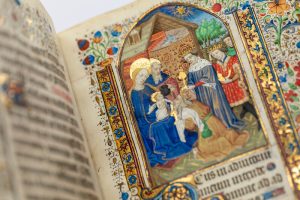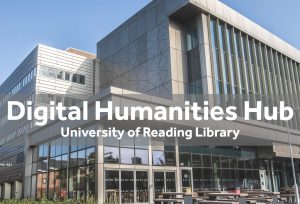Partners across disciplines
Our collections are wide-ranging, as are our research partnerships.
We enjoy connecting researchers across disciplines and across collections.
We engage with historical and social science research, creative and design practice, and with participatory research. To help deliver research impact, we connect stakeholders with collections which hold meaning for them, drawing on the expertise and partnerships within our museums and collections.
Because the significance of the collections cuts across traditional disciplinary divides, they provide excellent opportunities for co-creation, innovation and knowledge transfer with the cultural, heritage, and creative sectors both in the UK and internationally.
University of Reading

Within the University of Reading, several research centres are closely involved with collections-based research, including:
- The Beckett Research Centre
- Centre for Health Humanities
- Centre for Book Cultures and Publishing
- Centre for Economic Institutions and Business History
- Centre for Film Aesthetics and Cultures
- Graduate Centre for Medieval Studies
Much of the research into our collections comes from the academic schools and departments in which they are fully embedded:
- The Ure Museum forms part of the Department of Classics
- The Cole Museum and the Herbarium are both based within the University’s School of Biological Sciences
- The Lettering, Printing and Graphic Design collections are part of the Department of Typography and Graphic Communication
- The Geology collection is preserved by the Department of Geography and Environmental Science
- The East German Studies Archive is held by the Department of Modern Languages and Cultures
The University of Reading’s largest, centrally held collections (The MERL, Special Collections and Art Collections) are part of an enormous range of partnerships within both the University and the wider research community. This includes community and enthusiast groups. Many of these partnerships are structured around the collections’ core themes and strengths, with key examples including food and nutrition, landscape and design and books, printing and publishing.
Digital humanities hub

Read more about how we support digital scholarship by providing collections based expertise, access to collections and engagement channels, acting as a repository and as a partner in research in to collections based practice.
Interdisciplinary work

Some examples of our current and past interdisciplinary work include:
Information Design and Architecture in Persuasive Pharmacy Space: combating AMR is an inter-disciplinary project bringing together academics and practitioners in graphic and information design, architecture, ergonomics and human factors, and pharmacy. The project aims to consider how to support one of the strategic aims of the UK 5-Year Antimicrobial Resistance strategy 2013–18: that is to ‘improve the knowledge and understanding of antimicrobial resistance’. This AHRC funded project uses our Lettering, Printing and Graphic Design Collections.
The Farm-level Interdisciplinary approaches to Endemic Livestock Disease (FIELD) project researched the past, present and future of endemic livestock diseases, from scientific, social scientific and historical perspectives. It aimed to improve farming practices and reduce incidents of disease. This Wellcome funded project used the Museum of English Rural Life’s collections.
.
Harry Ransom Center
Two of the University of Reading Research Projects partner with the Harry Ransom Center, the research centre at The University of Texas, Austin.
WATCH (Writers and their Copyright Holders) is a database of copyright contacts for writers, artists, and prominent people in other creative fields. It is jointly run by the Universities of Reading and Texas with financial support from the Strachey Trust, the British Academy and the Arts Council of England, and is an innovative example of how the Internet can be used for co-operative research.
FOB (Firms Out of Business) is a companion project to WATCH. Like WATCH, FOB is run jointly by the Harry Ransom Center and University of Reading. FOB aims to record information about printing and publishing firms, magazines, literary agencies and similar organisations which are no longer in existence.
,